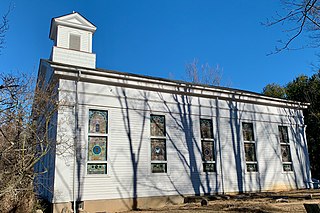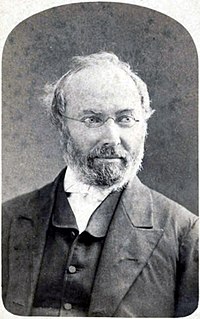Related Research Articles

Methodism, also called the Methodist movement, is a group of historically related denominations of Protestant Christianity which derive their doctrine of practice and belief from the life and teachings of John Wesley. George Whitefield and John's brother Charles Wesley were also significant early leaders in the movement. They were named Methodists for "the methodical way in which they carried out their Christian faith". Methodism originated as a revival movement within the 18th-century Church of England and became a separate denomination after Wesley's death. The movement spread throughout the British Empire, the United States, and beyond because of vigorous missionary work, today claiming approximately 80 million adherents worldwide.

The Methodist Episcopal Church (MEC) was the oldest and largest Methodist denomination in the United States from its founding in 1784 until 1939. It was also the first religious denomination in the US to organize itself on a national basis. In 1939, the MEC reunited with two breakaway Methodist denominations to form the Methodist Church. In 1968, the Methodist Church merged with the Evangelical United Brethren Church to form the United Methodist Church.
The Methodist Episcopal Church, South was the Methodist denomination resulting from the 19th-century split over the issue of slavery in the Methodist Episcopal Church (MEC). Disagreement on this issue had been increasing in strength for decades between churches of the North and South; in 1844 it resulted in a schism at the General Conference of the MEC held in Louisville, Kentucky.

Richard Allen was a minister, educator, writer, and one of America's most active and influential Black leaders. In 1794, he founded the African Methodist Episcopal Church (AME), the first independent Black denomination in the United States. He opened his first AME church in 1794 in Philadelphia, Pennsylvania.
The Methodist Church was the official name adopted by the Methodist denomination formed in the United States by the reunion on May 10, 1939, of the northern and southern factions of the Methodist Episcopal Church along with the earlier separated Methodist Protestant Church of 1828.

William Henry Willimon is an American theologian and bishop in the United Methodist Church, retired, who for eight years served the North Alabama Conference. He is Professor of the Practice of Christian Ministry and Director of the Doctor of Ministry program at Duke Divinity School. He is former Dean of the Chapel at Duke University and is considered by many as one of America's best-known and most influential preachers. A Pulpit & Pew Research on Pastoral Leadership survey determined that he was one of the two most frequently read writers by pastors in mainline Protestantism alongside the Roman Catholic writer Henri Nouwen. His books have sold over a million copies. He is also Editor-At-Large of The Christian Century. His 2019 memoir Accidental Preacher was released to wide acclaim, described by Justo L. Gonzalez as "An exceptional example of theology at its best."
Albert Cook Outler was a 20th-century American Methodist theologian and philosopher. Outler is generally considered to be one of the most important Wesley scholars in the history of the church as well as the first real United Methodist theologian. He was also a key figure in the 20th-century ecumenical movement.

Georgia Elma Harkness (1891–1974) was an American Methodist theologian and philosopher. Harkness has been described as one of the first significant American female theologians and was important in the movement to legalize the ordination of women in American Methodism.
Cokesbury is the retail division of the United Methodist Publishing House. Based in Nashville, Tennessee, Cokesbury serves as an agency of the United Methodist Church but serves also as an ecumenical resource provider to other denominations.

Hazen Graff Werner was a Bishop of The Methodist Church and The United Methodist Church, elected in 1948.
John Monroe Moore was a Bishop of the Methodist Episcopal Church, South, elected in 1918.
Charles Hutchinson Gabriel was a writer of gospel songs and composer of gospel tunes. He is said to have written and/or composed between 7,000 and 8,000 songs, many of which are available in 21st century hymnals. He used several pseudonyms, including Charlotte G. Homer, H. A. Henry, and S. B. Jackson.
The Wesley Study Bible is a Methodist-oriented biblical study text with introductory text for each book, explanations and commentary 'to help the reader to understand the biblical text', and with 'special references to the writings of John Wesley'.
Cokesbury College was a college in Abingdon, Maryland and later Baltimore, Maryland that existed from 1787 until 1796.
Elmer Talmadge Clark was an American writer, editor and denominational executive for the Methodist Church and supporting groups related to the Methodist Church. Most of his writings are interpretative of the religion and promotional booklets.

Cokesbury, historically known as Cokesburg, is an unincorporated community located on the border of Clinton and Tewksbury townships in Hunterdon County, New Jersey. It was named after two Methodist bishops, Coke and Asbury. The Cokesbury Historic District was listed on the state and national registers of historic places in 1997.

The history of Methodism in the United States dates back to the mid-18th century with the ministries of early Methodist preachers such as Laurence Coughlan and Robert Strawbridge. Following the American Revolution most of the Anglican clergy who had been in America came back to England. John Wesley, the founder of Methodism, sent Thomas Coke to America where he and Francis Asbury founded the Methodist Episcopal Church, which was to later establish itself as the largest denomination in America during the 19th century.
Edwin Mims (1872-1959) was an American university Professor of English literature. He served as the Chair of the English Department at Vanderbilt University in Nashville, Tennessee for thirty years from 1912 to 1942, and he taught many members of the Fugitives and the Southern Agrarians, two literary movements in the South. He was a staunch opponent of lynching, and a practicing Methodist.

Thomas OsmondSummers was an English-born American Methodist theologian, clergyman, hymnist, editor, liturgist and university professor. He is considered one of the most prominent Methodist theologians of the nineteenth century.
Sarah E. Gorham (1832–1894) was the first woman to be sent out as a missionary from the African Methodist Episcopal Church. Her life is not documented until 1880, when she visited family members who had moved to Liberia, presumably via the American Colonization Society. While there, she became interested in the people of the area and the programs of the missionaries. She has been described as a "missionary, church leaders, social worker". After this visit, she returned to the United States and was involved at the Charles Street African Methodist Episcopal Church. In 1888, at the age of 56, she went to the Magbelle mission in Sierra Leone, as the AME's first woman foreign missionary. At Magbele she established the Sarah Gorham Mission School, which gave both religious and industrial training. In July 1894 she was bedridden with malaria and died the next month. She was buried in the Kissy Road Cemetery in Freetown, Sierra Leone.
References
- ↑ Abingdon Press: About Us Archived April 12, 2010, at the Wayback Machine accessed April 3, 2010
- 1 2 3 4 Alan K. Waltz, "Abingdon Press," Archived 2017-03-07 at the Wayback Machine in A Dictionary for United Methodists. New York: Abingdon Press, 1991. Cited in United Methodist Church: Glossary: Abingdon Press, www.umc.org/.
- ↑ Leland D. Case, "Origins of Methodist Publishing in America," Papers of the Bibliographical Society of America, vol. 59, no. 1 (First Quarter 1965), pg. 27. In JSTOR.